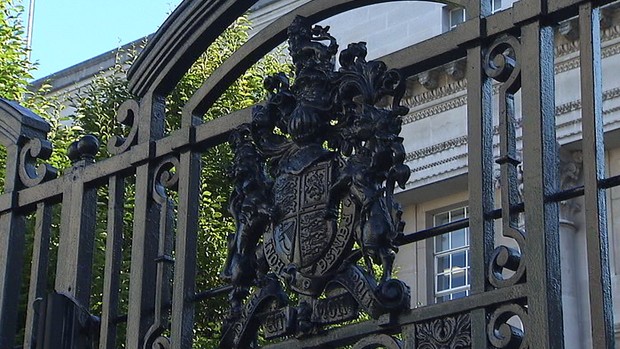Un uomo è stato illegalmente punito per essersi avvicinato al prominente repubblicano Colin Duffy mentre era in licenza temporanea
Gli avvocati di Sean McConville hanno sostenuto che le condizioni che proibivano il contatto con chiunque fosse legato ad attività criminali od organizzazioni paramilitari erano troppo vaghe.
Sean McConville, ventisettenne di Lurgan, sta scontando una condanna a 15 anni per possesso di esplosivi rinvenuti nel 2007 in città.
Ha perso i privilegi di prigione e gli sono state negate due licenze dopo essere stato visto l’anno scorso con Colin Duffy, Harry Fitzsimons e Brendan Conway.
I dirigenti carcerari hanno agito contro di lui sulla base di un accertamento di quelli con cui si era visto nel programma di pre-rilascio. Tutti e tre gli uomini avevano trascorso del tempo nell’ala repubblicana della prigione di Maghaberry.
Cercando una valutazione giudiziaria del Northern Ireland Prison Service per le sanzioni inflitte, l’avvocato Barry Macdonald ha parlato di violazione della vita privata e familiare, secondo quanto è contenuto nell’articolo 8 della Convenzione europea dei diritti dell’uomo.
Ha detto: “Le condizioni (di rilascio) sono così ampie, così poco chiare e così imprecise che non consentono al prigioniero di regolare le sue attività”.
Macdonald ha esposto l’affermazione secondo cui il suo cliente era stato impegnato con importanti figure repubblicane.
Ha affermato che c’era stato un errore nel fare una distinzione tra paramilitari e membri di un’organizzazione politica.
Neasa Murnaghan, per il Prison Service, ha ribattuto che McConville sapeva quello che aveva sottoscritto.
“Sarebbe stato molto facile per lui evitare di associarsi con queste persone”, ha detto .
La signora Murnaghan ha aggiunto che non era sufficiente per McConville “invocare di ignorare” chi fossero i tre uomini e le sue responsabilità.
A seguito delle osservazioni, il giudice Stephen si è riservato il giudizio per valutare se il ricorrente aveva presentato un caso da discutere in processo.
Fuori dal tribunale il legale di Sean McConville Darragh Mackin dello studio legale RKW ha affermato: “La punizione di detenuti per la violazione di condizioni (di rilascio) vaghe e indefinibili, basate su non verificate voci della PSNI, è in contrasto con i principi fondamentali dello stato di diritto e dei loro diritti ai sensi dell’articolo 8”.
Tratto da Utv
Prisoner ‘punished for Duffy connection’
A man jailed over a mortar bomb plot was unlawfully punished for associating with prominent republican Colin Duffy while on temporary release, the High Court has heard.
Lawyers for Sean McConville argued that conditions prohibiting contact with anyone linked to criminal activity or paramilitary organisations were too vague.
McConville, a 27-year-old Lurgan man, is serving a 15-year sentence for possession of explosives discovered in the town in 2007.
He lost prison privileges and was denied two further home leaves after being seen with Duffy and two other men, Harry Fitzsimons and Brendan Conway, late last year.
Prison chiefs took action against him based on an assessment of those he had associated with on the pre-release programme. All three men have spent time on the separated republican wing at HMP Maghaberry.
Seeking to judicially review the Northern Ireland Prison Service for the penalties imposed, Barry Macdonald QC claimed there had been a breach of McConville’s privacy and family life entitlements under Acticle 8 of the European Convention on Human Rights.
He said: “The conditions are so wide, so unclear and so imprecise that they do not allow the prisoner to regulate his activity.”
Mr Macdonald set out the allegation that his client had engaged with senior and prominent republican figures.
He claimed there was a failure to make a distinction between dissident paramilitaries and members of a political organisation.
Neasa Murnaghan, for the Prison Service, counted that McConville knew what he had signed up to.
“It would have been very easy for him to have avoided associating with these people,” she said.
Mrs Murnaghan added that it was not enough for McConville to “plead ignorance” about the three men and his responsibilities.
Following submissions Mr Justice Stephens reserved judgment on whether the applicant had established an arguable case.
Outside court McConville’s solicitor Darragh Mackin of KRW Law said: “The punishment of prisoners for breach of conditions that are vague and indefinable, based on untested hearsay evidence of the PSNI, is contrary to the basic principles of the rule of law and their rights under Article 8.”
